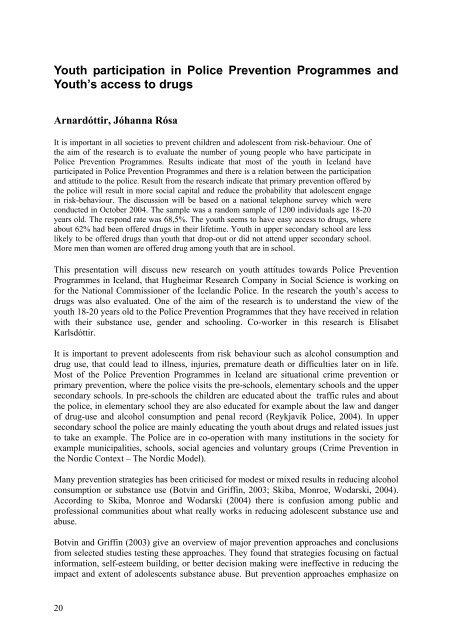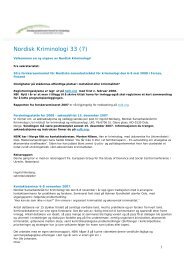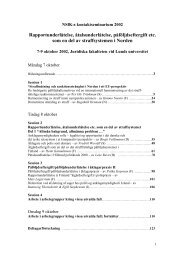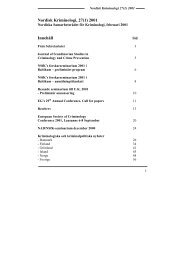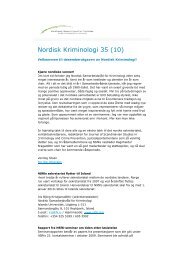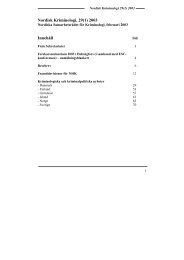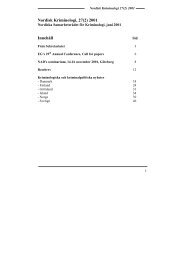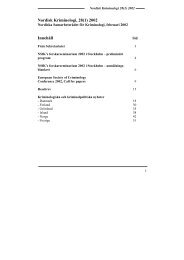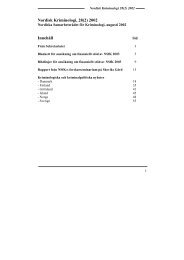NSfK:s 47th Research Seminar Oslo, Norway 2005 - Scandinavian ...
NSfK:s 47th Research Seminar Oslo, Norway 2005 - Scandinavian ...
NSfK:s 47th Research Seminar Oslo, Norway 2005 - Scandinavian ...
You also want an ePaper? Increase the reach of your titles
YUMPU automatically turns print PDFs into web optimized ePapers that Google loves.
Youth participation in Police Prevention Programmes and<br />
Youth’s access to drugs<br />
Arnardóttir, Jóhanna Rósa<br />
It is important in all societies to prevent children and adolescent from risk-behaviour. One of<br />
the aim of the research is to evaluate the number of young people who have participate in<br />
Police Prevention Programmes. Results indicate that most of the youth in Iceland have<br />
participated in Police Prevention Programmes and there is a relation between the participation<br />
and attitude to the police. Result from the research indicate that primary prevention offered by<br />
the police will result in more social capital and reduce the probability that adolescent engage<br />
in risk-behaviour. The discussion will be based on a national telephone survey which were<br />
conducted in October 2004. The sample was a random sample of 1200 individuals age 18-20<br />
years old. The respond rate was 68,5%. The youth seems to have easy access to drugs, where<br />
about 62% had been offered drugs in their lifetime. Youth in upper secondary school are less<br />
likely to be offered drugs than youth that drop-out or did not attend upper secondary school.<br />
More men than women are offered drug among youth that are in school.<br />
This presentation will discuss new research on youth attitudes towards Police Prevention<br />
Programmes in Iceland, that Hugheimar <strong>Research</strong> Company in Social Science is working on<br />
for the National Commissioner of the Icelandic Police. In the research the youth’s access to<br />
drugs was also evaluated. One of the aim of the research is to understand the view of the<br />
youth 18-20 years old to the Police Prevention Programmes that they have received in relation<br />
with their substance use, gender and schooling. Co-worker in this research is Elísabet<br />
Karlsdóttir.<br />
It is important to prevent adolescents from risk behaviour such as alcohol consumption and<br />
drug use, that could lead to illness, injuries, premature death or difficulties later on in life.<br />
Most of the Police Prevention Programmes in Iceland are situational crime prevention or<br />
primary prevention, where the police visits the pre-schools, elementary schools and the upper<br />
secondary schools. In pre-schools the children are educated about the traffic rules and about<br />
the police, in elementary school they are also educated for example about the law and danger<br />
of drug-use and alcohol consumption and penal record (Reykjavik Police, 2004). In upper<br />
secondary school the police are mainly educating the youth about drugs and related issues just<br />
to take an example. The Police are in co-operation with many institutions in the society for<br />
example municipalities, schools, social agencies and voluntary groups (Crime Prevention in<br />
the Nordic Context – The Nordic Model).<br />
Many prevention strategies has been criticised for modest or mixed results in reducing alcohol<br />
consumption or substance use (Botvin and Griffin, 2003; Skiba, Monroe, Wodarski, 2004).<br />
According to Skiba, Monroe and Wodarski (2004) there is confusion among public and<br />
professional communities about what really works in reducing adolescent substance use and<br />
abuse.<br />
Botvin and Griffin (2003) give an overview of major prevention approaches and conclusions<br />
from selected studies testing these approaches. They found that strategies focusing on factual<br />
information, self-esteem building, or better decision making were ineffective in reducing the<br />
impact and extent of adolescents substance abuse. But prevention approaches emphasize on<br />
20


